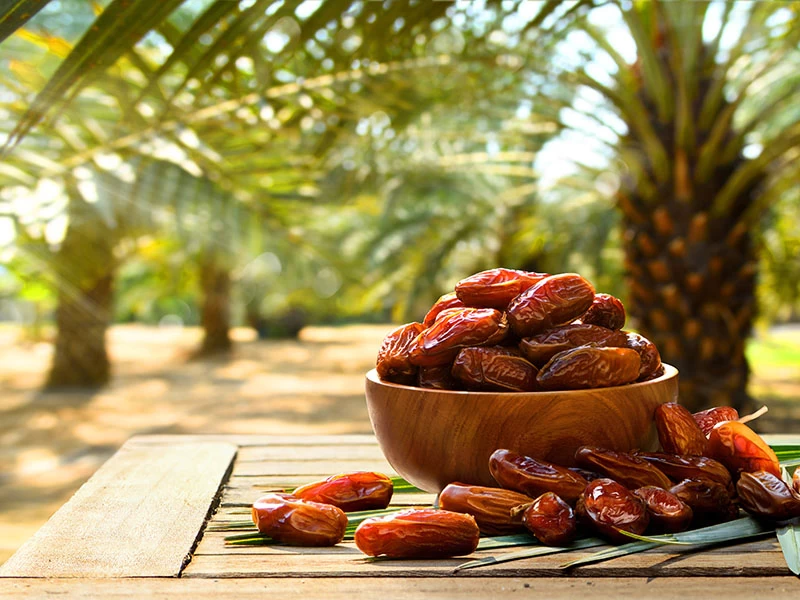Calcium is one of the most essential minerals for body health. It plays a key role in the health of bones, teeth, and proper muscle function. Additionally, calcium helps regulate heart and nervous system functions. For many of us, ensuring sufficient calcium intake through diet is one way to prevent diseases related to calcium deficiency.
While dairy products are considered the main source of calcium, many fruits also contain significant amounts of this mineral. Fruits not only are rich in calcium but also provide the vitamins, fibers, and antioxidants needed by the body. This article introduces the importance of calcium, the people who should pay attention to its intake, and the top 10 calcium-rich fruits.
The Importance of Calcium in the Diet
Calcium is one of the most important minerals for bone health. It plays a fundamental role in building and maintaining the strength of bones and teeth. The human body needs a high amount of calcium from childhood through adolescence to form strong and healthy bones. In adulthood, calcium helps prevent osteoporosis and reduce the risk of fractures.
Additionally, calcium is involved in the normal functioning of muscles and nerves. Muscles need calcium for contraction, and nerves need it to transmit messages. A deficiency in this mineral can lead to issues such as muscle cramps, fatigue, and even heart diseases. Therefore, including calcium-rich sources in the diet is essential.
Who Should Pay Attention to Calcium Intake?
While calcium is essential for everyone, some groups need to pay more attention to their intake. Growing children and teenagers need more calcium as it helps build strong bones. Pregnant and breastfeeding women also need sufficient calcium to support fetal growth and milk production.
Elderly should include calcium-rich sources in their diet due to decreased bone density. People with conditions such as lactose intolerance or kidney diseases may also face challenges in absorbing or managing calcium levels. These people should consider non-dairy calcium sources like fruits in their diet after consulting with a doctor.
Calcium-Rich Fruits
Fruits are a natural and healthy source of the calcium needed by the body. Although fruits do not contain as much calcium as dairy products, their consumption is beneficial due to the presence of vitamins, fibers, and antioxidants. Adding calcium-rich fruits to the diet can be a healthy and diverse option.
Here are 10 high-calcium fruits to include in your diet:
Dried Figs
Dried figs are one of the best plant sources of calcium. Every 100 grams of dried figs contain about 162 milligrams of calcium. This fruit is also rich in fiber, which aids digestion. Dried figs can be a healthy and nutritious snack for those looking to increase their calcium intake.
Besides calcium, dried figs contain significant amounts of iron and antioxidants, which help boost the immune system and improve overall health.
Oranges
Oranges are known as an excellent source of vitamin C, but they also contain a good amount of calcium. A medium-sized orange has about 52 milligrams of calcium. Regular consumption of oranges can help strengthen the immune system and improve bone health.
This fruit also helps in better absorption of calcium from other food sources. The vitamin C in oranges increases calcium absorption from the intestines.
Kiwi

Kiwi is a rich source of calcium, vitamin C, and fiber. Every 100 grams of kiwi contains about 34 milligrams of calcium. This fruit helps in digestive health and strengthens bones.
Kiwi also contains antioxidant compounds that help reduce body inflammation and boost the immune system.
Raspberries
Raspberries are another calcium-rich fruit, with every 100 grams containing about 40 milligrams of calcium. This low-calorie fruit is full of fiber, which is beneficial for heart health and weight control.
Raspberries also contain antioxidants that protect cells from damage caused by oxidative stress.
Dates

Dates are an excellent source of energy and calcium. Every 100 grams of dates contain about 64 milligrams of calcium. Besides calcium, dates are rich in potassium and magnesium, which help in heart and muscle health.
Consuming dates as a healthy snack can meet the body's energy and mineral needs.
Prunes
Prunes are one of the best fruits for bone health due to their calcium and vitamin K content. Every 100 grams of prunes contain about 43 milligrams of calcium. This fruit is also very beneficial for digestive health.
Consuming prunes can help reduce the risk of osteoporosis in the elderly.
Pineapple
Pineapple contains a good amount of calcium and manganese. Every 100 grams of pineapple contains about 13 milligrams of calcium. Besides calcium, this fruit is rich in the enzyme bromelain, which aids in protein digestion.
Pineapple is also beneficial for joint health due to its anti-inflammatory properties.
Strawberries
Strawberries, with their delightful taste, are a rich source of calcium and vitamin C. Every 100 grams of strawberries contain about 16 milligrams of calcium. This fruit helps boost the immune system and improve skin health.
Consuming strawberries can help prevent heart diseases and reduce body inflammation.
Grapes
Grapes contain a significant amount of calcium and potassium. Every 100 grams of grapes contain about 18 milligrams of calcium. This fruit helps lower blood pressure and improve heart health.
Grapes also contain antioxidants that support cell health.
Papaya
Papaya is a tropical fruit with a good amount of calcium. Every 100 grams of papaya contains about 20 milligrams of calcium. This fruit helps improve digestive health and strengthen bones.
Papaya also contains the enzyme papain, which aids in better digestion.
Conclusion
Ensuring sufficient calcium intake is crucial, especially for maintaining bone health and preventing diseases like osteoporosis. Fruits can be a healthy and natural source to meet part of the body's calcium needs. Adding calcium-rich fruits to the daily diet is a simple and effective way to improve overall body health.
Frequently Asked Questions
- Can fruits replace dairy products for calcium intake?
Fruits can provide part of the calcium needed by the body, but they usually cannot completely replace dairy products. Individuals with specific needs should consult with a doctor or nutritionist.
- Do all individuals need the same amount of calcium?
The amount of calcium needed varies based on age, gender, and specific conditions such as pregnancy or illness. Generally, adults need about 1000 to 1200 milligrams of calcium daily.





